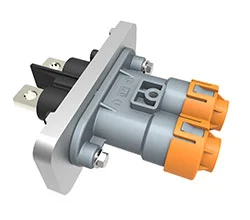𐄀 Technology Connection to Future

As the world moves towards a greener future, electric vehicles (EVs) are rapidly gaining popularity among consumers and governments alike. With the rise in the number of EVs on the road, the demand for efficient and reliable charging infrastructure has become increasingly important. One crucial component of this infrastructure is the EV charging connector. In this article, we will explore the ev charging connector market, its standardization, key players, and the various types of electric vehicle charging connectors available.
In order to ensure seamless charging experiences for EV owners, an industry-wide standard for EV charging connectors has been established. This standard enables different EV models to be charged using the same charging infrastructure, regardless of the brand or manufacturer. The widely accepted global standard for EV charging connectors is the Type 2 connector, also known as the Mennekes connector. This connector is compatible with most EV models and is widely used in Europe and other parts of the world.
The ev connectors market has witnessed significant growth in recent years. With the increasing adoption of EVs worldwide, the demand for high-quality charging connectors has soared. This has led to intense competition among manufacturers to produce reliable and efficient charging connectors. The market is attracting both established companies and new players who are investing in research and development to offer innovative electric vehicle charging solutions to meet the growing demand.
One prominent player in the EV charging connector market is Yonggui. With a focus on quality and reliability, Yonggui has established itself as a leading manufacturer of EV charging connectors. The company offers a wide range of connectors that adhere to global standards, including the Type 2 connector. Yonggui's connectors are known for their durability, safety features, and compatibility with various EV models. By continuously improving their products and keeping up with industry requirements, Yonggui has positioned itself as a trusted brand among EV owners and charging station operators.
There are several types of electric vehicle charging connectors available in the market that cater to different charging needs and power levels. These include Type 1 connectors (also known as J1772 connector or SAE J1772 standard), which are commonly used in North America and Japan, and Type 3 connectors (also known as Scame connector), which are commonly used in Europe. Additionally, rapid charging connectors, such as the CHAdeMO and CCS connectors, are designed to provide high-power charging for faster recharge times. These options ensure that EV owners have access to suitable charging connectors, regardless of their location or charging requirements.
In conclusion, the ev charging connector market is a rapidly expanding industry driven by the increasing adoption of electric vehicles worldwide. The standardization of EV charging connectors ensures compatibility and convenience for EV owners, while electrical connectors manufacturers like Yonggui continue to innovate and offer reliable solutions. With a wide range of electric vehicle charging connectors available, the industry is well-equipped to meet the diverse charging needs of EV owners. As the demand for EVs grows, the ev charging connector market will undoubtedly play a crucial role in shaping the future of electric mobility.
